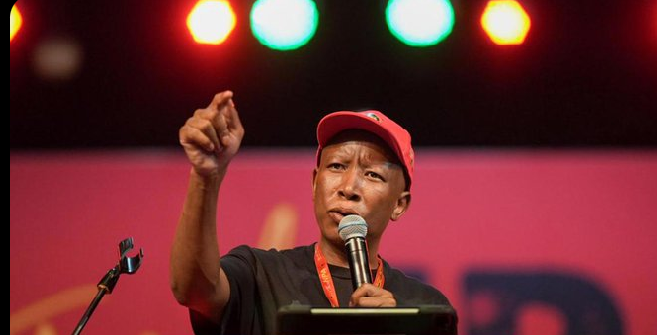Economic Freedom Fighters (EFF) leader Julius Malema has once again ignited controversy with incendiary remarks, declaring that “a revolution demands that at some point there must be killing,” and urging his supporters not to fear violence in the pursuit of political change. The provocative statement, made during a fiery address to party members, has reignited public debate about the role of violence in South Africa’s democratic landscape.
Known for his inflammatory rhetoric, Malema argued that genuine revolutions are rarely bloodless, emphasizing that historical struggles for freedom have often involved sacrifice, including loss of life. “You must never be afraid to kill,” he stated, framing violence as an inevitable tool in dismantling systems of oppression. His comments were met with enthusiastic cheers from EFF supporters but have drawn sharp criticism from political rivals, civil society groups, and legal experts.
"You must never be scared to kill, a revolution demands that at some point there must be killing because the killing is part of the revolution" ~ Julius Malema
"Shoot to kill, kill the Boer, the farmer, Kill the Boer, the farmer" ~ Julius Malema pic.twitter.com/ld1Lngk8xH
— African Hub (@AfricanHub_) February 9, 2025
Widespread Condemnation
Opposition parties and human rights organizations have condemned Malema’s remarks as reckless and dangerous, accusing him of inciting violence and undermining South Africa’s constitutional democracy. The African National Congress (ANC) and the Democratic Alliance (DA) both issued strong rebukes, warning that such rhetoric could inflame tensions in an already volatile political environment.
Legal analysts are now examining whether Malema’s statements could warrant criminal investigation under South Africa’s laws against incitement to violence. “The right to freedom of speech does not extend to advocating for murder,” one legal expert noted, suggesting that Malema’s words may have crossed legal boundaries.
EFF Defends Malema
Despite the backlash, EFF spokespersons have defended Malema’s comments, arguing that they were taken out of context and intended to highlight the harsh realities of the fight against economic inequality and systemic injustice. They contend that the focus should be on the government’s failure to address these issues, rather than on Malema’s choice of words.
A Nation Grappling with the Fallout
As the dust settles, South Africa is left to grapple with the implications of such extreme rhetoric in a democracy still healing from its violent past. While Malema continues to position himself as a radical challenger to the status quo, critics warn that his words could do more than stir political fervor—they could incite real violence.
The controversy underscores the delicate balance between free speech and the responsibility of political leaders to promote peaceful dialogue. As the nation reflects on Malema’s remarks, the debate over the role of violence in political change remains as divisive as ever, raising urgent questions about the future of South Africa’s democracy.






















